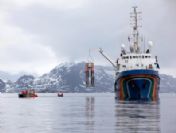epa02184799 A handout picture released by Greenpeace on 03 June 2010 shows one of the nine mesocosms being towed into place by IFM-GEOMAR scientists, after being lowered into the fjord from the deck of the Greenpeace ship Esperanza in Kongsfjord, near the Arctic scientific research station of Ny-Alesund in Svalbard, Norway, 31 May 2010. The mesocosm will be attached to pre-placed mooring buoys, securedmade ready for the experiment. The Esperanzaits crew are working with scientists from the German marine research institute IFM-GEOMAR to investigate ocean acidification, by deploying nine large 'mesocosms' in Kongsfjord. The mesocosms are being used to investigate future implications of ocean acidification, a phenomenon caused by carbon dioxide (CO2) emissions that has just as much potential to damage marine ecosystems as climate change. Absorption of excess CO2 pollution by seawater causes its PH level to drop, making it more difficult for creatures integral to the food web to form shellsskeletons. EPA/NICK COBBING - HANDOUT IMAGE AVAILABLE FOR DOWNLOAD BY EXTERNAL MEDIA FOR 14 DAYS AFTER RELEASE. TERMS OF HAND-OUT: NO RESALE, NO ARCHIVE, FOR EDITORIAL USE ONLY, NOT FOR MARKETING OR ADVERTISING CAMPAIGNS. EDITORIAL USE ONLY/NO SALES
03.06.2010 10:53:35
Norway Scıence
NORWAY SCIENCEEPA02184799 A HANDOUT PİCTURE RELEASED BY GREENPEACE ON 03 JUNE 2010 SHOWS ONE OF THE NİNE MESOCOSMS BEİNG TOWED İNTO PLACE BY IFM-GEOMA



















